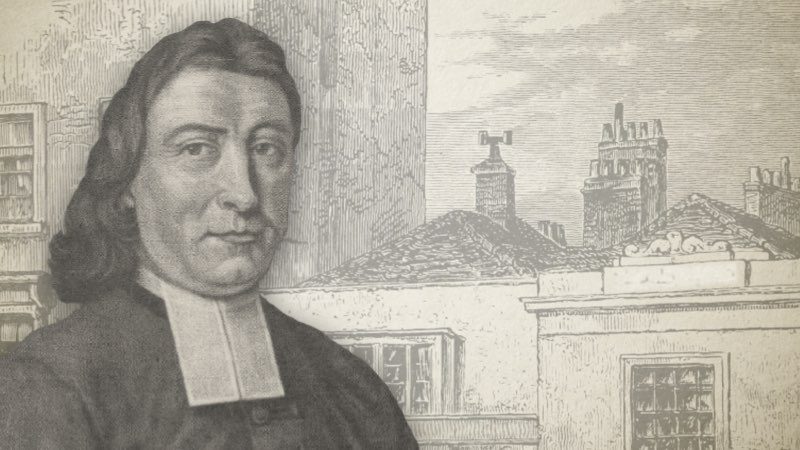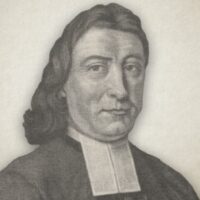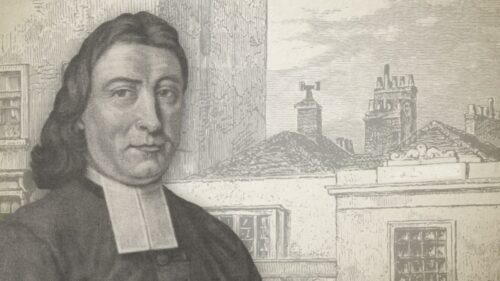
Epistle To The Reader
Reader, having met with very gracious dealings from my God, not only in carrying me through a large tract formally,[1] but in blessing the publication thereof to so many souls far and near, as holy and savoury testimonies {of their experience upon this argument by me in manuscript} do witness; and since there are very few copies of the 500 books printed, now remaining, which are not sold off, my heart has been again drawn forth to publish a new labour.
As to my former volume I’ll add one caveat to the reader, to take off an undo aspersion, for it hath been insinuated, as if I had there stolen what hath been confessed to be excellent about eternal things, out of Dr. Goodwin’s volume two, and part one. I am bound to declare, that this is utterly false! For all those things were meditated in my own thoughts, digested into the form they appear in, and were all printed off before ever I saw the Doctor’s treatise, where there is said to be such a harmony. Nor had I seen it then, but that providentially I heard it spoken to me, concerning what the doctor had written. If I had seen him, it is very probable my thoughts might have been carried to another subject; for I do not choose to write the same things which I know to have been well done before. I do not know to this day, that there is anything in it like plagiarism or book-stealing. If it appears to be another, let the parallel decide it. Let the Doctor be put in one column, and let me be put in another column, thereby comparing the two. For without a demonstration of the fact, it is a bearing of false witness to publish it.
The doctrine of the descent of Christ’s humanity, there opened and maintained, without either the heretical elapse, or any abstract notion of pre-existence, to cut off one part of his sacred humanity from another {for pre- existence is accustomed to be confined to souls, and not extended to bodies, in the schools of Plato} wherewith some men would fight against it, and others cloud it, is a Doctrine of Christ, which through Grace, will be more and more illustrated and confirmed from the Scriptures, since it’s broken out into the world; and at this day doth shine the brighter, from the Spirit of Christ, through the curtain, and stands the firmer, even through the feebleness of the opposition. Let impartial readers examine the cause of both sides.
I had written a small essay upon two things in the Revelation, the one is, to prove the drying up of the River Euphrates, as to the overflowings of it upon the European side of the Empire, to be passed, since the Treaty of Karlowitz in 1699. And the other is, to prove that the two witnesses spoken of in Revelation chapter eleven arose and stood upon their feet in Great Britain in the year 1687,[2] or an entire commentary upon the 11th of the Revelation. And particularly, that the street of the great city of Rome which hath reigned over the kings of the earth, is a word fitly adapted by the Holy Ghost, not only to the geographical situation and length of England and Scotland, as a Street that bears its proportion to a City, but is fitted to the fore-view of the Union of the Two Kingdoms into One, and so designed by the spirit of Prophecy; that by putting this double pointer over the text-hand, we may not be at a loss in finding out where to read the Divine Accomplishment; wherein also are overthrown all the pretensions of an earlier rising of the Witnesses among the Waldensians. But the Lord hath at present put me upon another work, and filled me with more earnest longing to attempt something towards a rectifying of the Office of a Preacher Sent.
This piece therefore, so far as the Lord hath shown me, is to set part of the Doctrine of the Gospel in a clearer light than either nature or education have discerned it. The discourse beats down offers of Grace and of Christ to sinners, tenders and proposals of Grace and of Christ to sinners. And doth not this sound harsh? But what is it in us which makes us think so? Is it Grace or Nature? Read the treatise and then judge, whether the emphasis is to be laid upon the Free Grace of God in Christ to sinners; or, upon offers, tenders and proposals; and you will see that sinners have a great deal more given them {as to their eternal relation in Christ, &c.,} both by God in Christ, and by the doctrine in this treatise, than so imagined.
But there are some among us who tell you, that they do not like controversy. This may be so; as difficulties and unbelief in doctrines make them controversial. These have more need therefore to be cleared. He that believes only that which was never controverted, believes perhaps in effect little more than that the sun shines, or that the rain falls. He is something of a naturalist, and perhaps that is near all he is good for? If he has taken up anything of Religion, he has taken it up surely upon some outward trust, without any inward power or experience. {“For the kingdom of God is not in word, but in power.” I Cor.4:20.} Whatsoever a man is convinced he sees, controversy ceases respecting that thing. But till your soul doth truly behold it, {by the sealing work of God the Spirit,} you know not whether it be true or false; if it once becomes your faith, your doubts will vanish. You live by it, and have done prating. Debates are swallowed up when they shine in Gospel Evidence. Oh, but still you say you do not love controversy! It is very hard to beat men off from harping upon this string. Well, pray what is it you do love? Do you love the shop? Do you love to buy and sell? Take heed of it; that is all controversy; for one thinks the article worth so much, another says it is worth so much; and here they raise a controversy. The buyer is sometimes controverting the price before he can be brought up to the seller’s charge; and the seller is controverting it, and giving whole lengths of words, before he sells you one inch of matter, or can be brought down to the terms of this merchant. Besides, what love have you for your estates? What value have you for your rights and property in this world? Are these never controverted? When they are called in question, and your rights invaded, do you defend your rights, and give fees to a lawyer, and stand a trial of the cause with your adversary, and that at a far greater charge than the price of a small book? Is not this controversy? You will go on nevertheless; saying, you are in the right, you will have a trial; you will not be duped. Yet how suddenly does the name of a controversy run some off from looking into the things of God? How tamely do they give up their rights {for controversies are putting God’s children’s rights upon trial} about God in Christ, and of the Kingdom of Heaven? How easily doth Satan and their own corruption beat them off from discoveries of their right to the best things, as if they had no interest therein. What think you of God’s Book? Is there no controversy in that? Why do you buy a Bible with the book of Job in it? That book is a controversy between him and his three friends; and, perhaps, you have not skill enough to tell me which of them was in the right? May it not be feared that you who say that you do not love controversy, love the world visibly more than you visibly love the Lord Jesus Christ? For if you did not, it would be hard for you either to find a heart or a tongue to talk at this rate. Let me shut it up in a word; for what is it that is not a controversy? Do you possess one point that is of any significant value that has not been sifted and scrutinized in the furnace {of experimental Grace and truth} that is not so? {“Every man’s work shall be made manifest; for the day shall declare it, because it shall be revealed by fire; and the fire shall try every man’s work of what sort it is.” I Cor.3:13.} How can you be against controversies, when God is for them, Christ is for them, and the Spirit is for them? The book of Job is a controversy between man and man. The whole Bible is a controversy between God and the Sinner, between Christ and Antichrist, between the Spirit and the World. Yea, it is all controversy between God, and good men in their faults. Everything that strikes at a man’s faults, as this Book does, is a controversy between God and sin. {“Hear the word of the LORD, ye children of Israel; for the LORD hath a controversy with the inhabitants of the land, because there is no truth, nor mercy, nor knowledge of God in the land.” Hos.4:1.}
Well, but some say the thing is tedious. We love short undertakings. But why is that? Perhaps because you have no inheritance in these matters; or, at least, do not yet see it, or what may be even worse, have no concern, care or desire to see it. These papers are despised. Why? Because they do not make out the title to some estate, house or lands; otherwise the length of the matter would be no objection, but a security to the title. Who ever found fault in purchasing an estate, house or land, {which yet make up a local world that must be set on fire at the latter day, when the Doctrine of the Gospel will bear the flames, while the whole world shall be burnt up} and cared not to meddle with the estate, because the writings were a little tedious and puzzling; or because in the grand deed of settlement and conveyance there was so much exposure of error and naming of men? It comes to pass that men will not buy the truth of Christ. Why? Because it is so bulky in leaves, so much detecting of the errors of men, and so full of controversy, that it is too much for their narrow penny. Whereas they forget that the bargain of the book is easy, since the whole estate mentioned in the writings is all freely bestowed and given gratis to the children of God in the Covenant’s Everlasting Rolls! It is plain that men trifle with their souls, but are in earnest with their bodies and estates. Elaborate writings have been sanctified of God to the belief of the Gospel; and the longer our thoughts are kept close to the matter, and brought to view and attend spiritual things, the more we are enabled to see into them.
In the chapter which respects inviting sinners to come to Christ, I have shown the phrase of coming to Christ was fitted to Him when He was once upon the earth. Nevertheless, men have applied it in present relation to Christ, since he is ascended into Heaven. I cannot say but heretofore I may have used the phrase, though sparingly, when it was necessary I should be understood in it, as keeping close to another man’s phrases; and where my work swelled into so great a bulk, that I had no room to discuss it, if I had raised the least doubt upon it. But here it comes in my direct way to state and expound the Truth of the matter respecting these things.
In the things of God I have not empty margins. What is an empty margin? Why, when it’s run on through entire pages in the things of God, all in a man’s own words, and no frequent assistances come in upon the brim of the paper {for when we print, it’s presented to the eye} from God’s Word. And how this can be accounted for in men not Divinely inspired, I am at a loss to tell you? I have, as helped to confirm the matter of my argument from testimonies of God’s Holy Word, placed a plenteous company of scriptures in my work, not as ornaments of the page, but as so many redundant proofs besides the other texts, which are brought, or opened in the body of the treatise.
I leave all in thy hands, reader, with the blessing of the Lord of Hosts, who filleth the hungry with good things, but the rich he sendeth empty away,
Joseph Hussey
——————————-
[1] Reference is to Hussey’s previous work titled, Glory of Christ Unveiled, or the Excellency of Christ Vindicated, 1706.
[2] Reference here no doubt is to the Declaration for Liberty of Conscience, a proclamation made by James II of England in 1687. The Indulgence was a first step at establishing Religious Freedom in the British Isles. The Declaration granted broad religious freedom by suspending penal laws enforcing conformity to the Church of England and allowing persons to worship in their homes or chapels as they saw fit, and ended the requirement of affirming religious oaths before gaining employment in government office. By use of the royal suspending power, the king lifted the religious penal laws and granted toleration to the various denominations, Catholic and Protestant, within his kingdom.
Joseph Hussey (1660-1728) was a Congregational preacher. He was converted to Christ in 1686 after reading Stephen Charnock’s, “The Existence And Attributes Of God.” In 1688, he was ordained to the Gospel Ministry and was appointed the Pastor of a church in Hitchen. In 1691, he was appointed the Pastor of a church in Cambridge. In 1719, he was appointed the Pastor of a church in Petticoat Lane, London. He nurtured high views of sovereign grace, setting out a clear case against the free offer of the gospel. His teachings on this subject were published in a book called, “God’s Operations Of Grace But No Offers Of His Grace” (1707).
Joseph Hussey, God's Operations Of Grace But No Offers Of His Grace (Complete)




